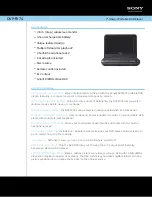
GP Series
8
©2013 Smarter Tools, Inc. All Rights Reserved
General Safety Precautions (cont’d)
_________________________________________________________________________________________________
Electrical Safety
•
Keep all electrical equipment clean and dry. Replace any wiring where the insulation is cracked, cut eroded part or
otherwise degraded. Replace terminals that are worn, discolored, or corroded. Keep terminals clean and tight.
•
Insulate all connections and disconnected wires.
•
Do not abuse the power cord. Keep power cords away from heat, oil, sharp edges, or moving parts. Replace
damaged power cords immediately. Damaged power cords increase the risk of electric shock.
•
Do not operate the generator with wet hands. Do not expose generator to rain, snow or wet conditions. Water will
increase the risk of electric shock. The generator is a potential source of electrical shock if not kept dry.
•
Do not attempt to connect or disconnect load connections while standing in water, or on wet or soggy ground.
•
Do not touch electrically energized parts of the generator and interconnecting cables or conductors with any part of
the body, or with any non-insulated conductive object.
•
Avoid body contact with grounded surfaces such as pipes, radiators, ranges, and refrigerators. There is an
increased risk of electric shock if your body is grounded.
•
When operating a power tool outside, use an outdoor extension cord marked “W-A” or “W”. These extension cords
are rated for outdoor use, and reduce the risk of electric shock.
•
Grounded tools must be plugged into an outlet properly installed and grounded in accordance with all codes and
ordinances. Never remove the grounding prong or modify the plug in any way. Do not use any adapter plugs.
•
Double insulated tools are equipped with a polarized plug where one blade is wider than the other. This plug fits in
a polarized outlet only one way. If the plug does not fit fully in the outlet, reverse the plug. If it still does not fit,
contact a qualified electrician to install a polarized outlet. Do not change the plug in any way. Double insulation
eliminates the need for the three-wire grounded power cord and grounded power supply system.
•
Before servicing equipment powered by the generator, disconnect the equipment from its power input.
•
The generator must be earth-grounded for fixed installations in accordance with all relevant electrical codes and
standards before operation.
•
Grounding provides a low-resistance path to carry electricity away from the user in the event of an electrical
malfunction.
•
All connections and conduits from the generator to the load must only be installed by trained and licensed
electricians and in compliance with all relevant local, state, and federal electrical codes and standards, and other
regulations where applicable.
•
Connect the generator only to a load or electrical system (110/120 volt) that is compatible with the electrical
characteristics and rated capacities of the generator.
•
NEVER
try to power building or home wiring by plugging the generator into a wall outlet, a practice known as
“backfeeding.” This is extremely dangerous and presents an electrocution risk to utility workers and neighbors
served by the same utility transformer. It also bypasses some of the built-in household circuit protection devices.
Personal Safety
CAUTION:
DO NOT SIT, STAND, OR PLACE OBJECTS ON TOP OF THE GENERATORS FUEL TANK.
REGARDLESS OF WHETHER IT IS RUNNING OR NOT.
•
Stay alert. Watch what you are doing, and use common sense when operating a generator. Do not use generator
while tired or under the influence of drugs, alcohol, or medication. A moment of inattention while operating
generators may result in serious personal injury.
•
Make note of the location of the engine power switch should you need to turn off the generator quickly.
•
Dress properly. Contain long hair, clothing, jewelry, and gloves as they can be caught in moving parts.
•
Avoid accidental starting. Make sure the power switch is in its “OFF” position, and disconnect the spark plug wire
when not in use.















































